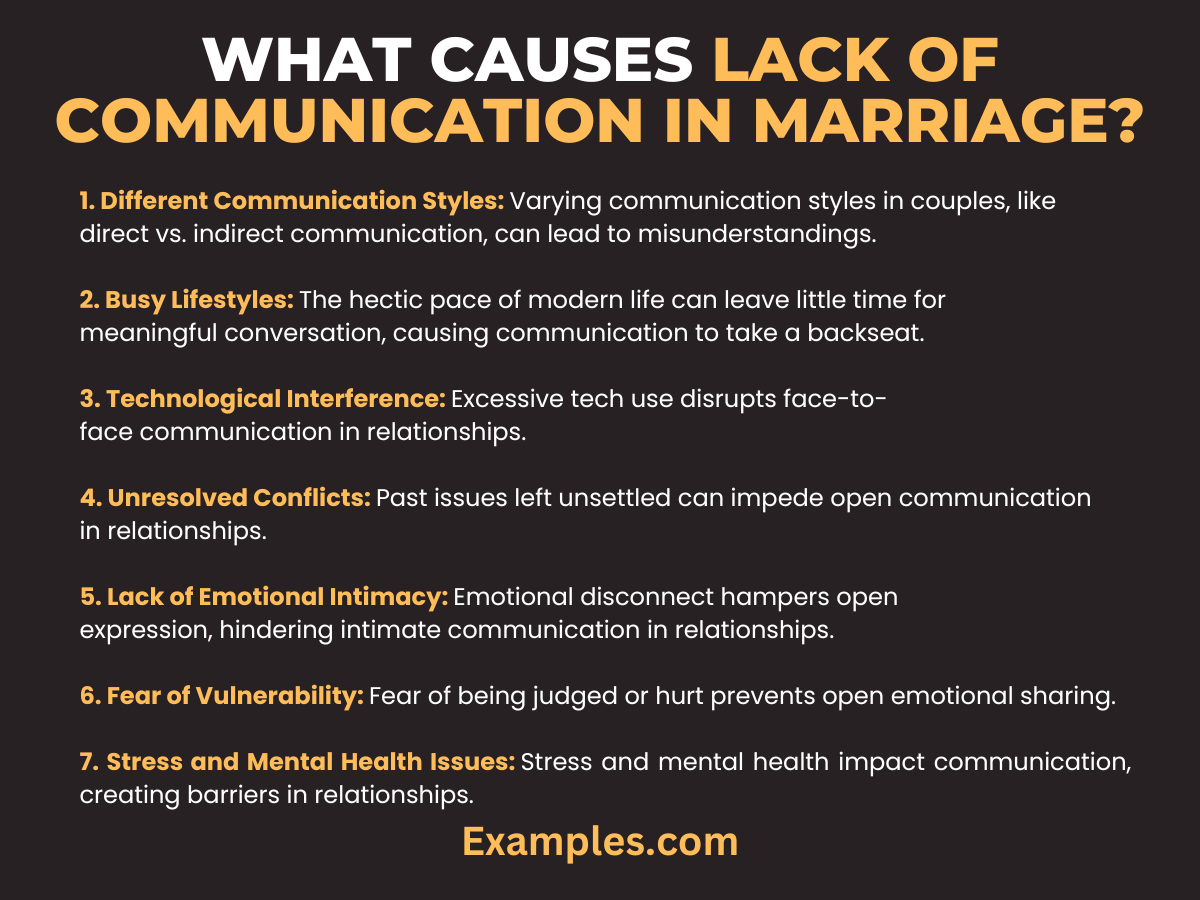10+ Lack of Communication in Marriage Examples
Navigating the complexities of Lack of Communication in Marriage can be challenging, yet it’s crucial for a healthy relationship. This guide delves into the root causes, effects, and practical solutions to overcome communication barriers. With real-world examples and expert tips, it offers invaluable insights into improving communication skills and rebuilding the emotional connection often lost in marriages. It’s an essential resource for couples seeking to enhance understanding and intimacy in their relationship.
What Causes Lack of Communication in Marriage?

- Different Communication Styles: Couples often have varying communication styles. One may prefer direct conversation, while the other might use indirect hints or nonverbal cues, leading to misunderstandings.
- Busy Lifestyles: The hectic pace of modern life can leave little time for meaningful conversation, causing communication to take a backseat.
- Technological Interference: Overuse of technology, like smartphones and social media, can distract partners from engaging in face-to-face communication.
- Unresolved Conflicts: Past unresolved issues can create barriers to open communication, as one or both partners might avoid discussions to prevent further conflict.
- Lack of Emotional Intimacy: Emotional disconnect can make it challenging to share thoughts and feelings, leading to a breakdown in communication.
- Fear of Vulnerability: A fear of being vulnerable or judged can prevent partners from expressing their true thoughts and feelings.
- Stress and Mental Health Issues: Stress, depression, or anxiety can significantly impact one’s ability to communicate effectively.
- Cultural or Language Barriers: Differences in cultural backgrounds or primary languages can sometimes lead to misunderstandings in communication.
Lack of Communication in Marriage Leads to Divorce
Lack of communication in marriage can indeed lead to divorce. Effective communication is a cornerstone of a healthy and lasting marriage. When couples struggle to communicate openly and honestly with each other, it can lead to a range of issues that ultimately result in marital dissatisfaction and, in some cases, divorce.
Here are some ways in which a lack of communication can contribute to divorce:
- Misunderstandings: Without clear communication, misunderstandings can arise easily. Unresolved misunderstandings can build up over time and create resentment between spouses.
- Unresolved Conflicts: Failure to address and resolve conflicts can lead to ongoing tension in the marriage. When conflicts are left unresolved, they can fester and cause emotional distance.
- Emotional Disconnect: Lack of communication can create emotional distance between partners. Over time, this emotional disconnect can erode the intimacy and closeness that are essential in a marriage.
- Unmet Needs: If spouses don’t communicate their needs, desires, and expectations, it can lead to unmet needs and feelings of neglect.
- Growing Apart: When couples don’t share their thoughts, feelings, and experiences, they may grow apart over time, feeling like they have little in common.
While it’s important to note that not all marriages with communication issues end in divorce, addressing and improving communication is crucial for a healthier and more satisfying marriage. Couples therapy or marriage counseling can be effective ways to learn better communication skills and work through existing communication problems to prevent divorce.
Impacts of Lack of Communication in Marriage
- Emotional Disconnection: Partners may feel emotionally isolated, leading to loneliness and a sense of neglect within the marriage.
- Resentment Build-up: Unexpressed feelings can accumulate over time, leading to deep-seated resentment and anger.
- Reduced Intimacy: Communication is key to intimacy; its absence can lead to a decline in both emotional and physical closeness.
- Increased Stress: The uncertainty and misunderstandings arising from poor communication can heighten stress levels in both partners.
- Poor Conflict Resolution: Lack of effective communication skills often results in unresolved conflicts and ongoing tension.
- Impacted Children: Children in the household can be adversely affected by the negative atmosphere created by poor communication between their parents.
- Reduced Social Interaction: Couples may withdraw from social activities due to the strain in their relationship.
- Mental Health Concerns: Continuous communication issues can contribute to mental health problems like depression and anxiety.
Signs of Lack of Communication in Marriage
- Frequent Misunderstandings: Regular misunderstandings signal a breakdown in effective communication.
- Avoiding Conversations: Deliberately avoiding discussions about certain topics or general communication is a red flag.
- Increased Arguments: A rise in arguments over trivial matters often indicates underlying communication issues.
- Lack of Empathy: Failing to understand or acknowledge each other’s feelings can be a sign of communication breakdown.
- Feeling Unheard or Misunderstood: Consistently feeling that your partner does not understand or listen to you is a significant indicator.
- Silent Treatment: Regularly resorting to silence as a response during disagreements points to communication issues.
- Reduced Shared Activities: A decrease in activities enjoyed together can stem from poor communication.
- Emotional Withdrawal: Withdrawing emotionally from the relationship often accompanies a breakdown in communication.
How Does Lack of Communication Affects Marriage?
- Diminished Mutual Respect: Persistent lack of communication can erode the mutual respect necessary for a healthy relationship.
- Loss of Shared Goals: Couples may find themselves drifting apart in terms of life goals and aspirations due to a lack of shared communication.
- Decreased Affection: Affectionate gestures and words tend to decrease, affecting the overall warmth of the relationship.
- Increased Isolation: Partners may start to feel isolated and disconnected, both from each other and from their shared social circles.
- Escalation of Petty Issues: Minor issues can escalate into significant problems without open communication.
- Vulnerability to External Stressors: The relationship becomes more vulnerable to stress from external sources due to weakened communication.
- Reduced Conflict Resolution Ability: The capacity to resolve conflicts amicably diminishes significantly.
- Impact on Physical Health: Chronic stress from poor communication can have adverse effects on physical health, including increased risk of heart disease and weakened immune response.
How Many Marriages Fail Because of Lack of Communication?
Many marriages experience difficulties due to a lack of effective communication. This issue can lead to misunderstandings, unresolved conflicts, and emotional distance between partners. While it’s challenging to pinpoint an exact percentage of marriages that fail solely because of communication issues, research suggests that communication problems are a significant factor in many divorces.
In the United States, for instance, couples often cite communication breakdown as a primary reason for their marriage troubles. According to various studies, it is estimated that around 65-70% of divorces involve communication problems as a contributing factor.
Communication is vital in any relationship, and its absence can lead to various problems, including misalignment of expectations, feelings of neglect, and difficulty resolving conflicts. To prevent communication issues from negatively impacting your marriage, it’s crucial to prioritize open and honest conversations, active listening, and seeking professional help when necessary.
How to Fix Lack of Communication in Marriage?
- Open and Honest Dialogue: Encourage regular, open, and honest communication about feelings, needs, and concerns.
- Active Listening Skills: Practice active listening, where each partner pays full attention and acknowledges the other’s perspective.
- Scheduled Check-ins: Establish regular check-ins or ‘date nights’ to ensure ongoing communication and connection.
- Conflict Resolution Strategies: Learn and practice healthy conflict resolution strategies, avoiding blame and focusing on solutions.
- Emotional Vulnerability: Encourage and practice emotional vulnerability with each other to deepen the connection.
- Communication Workshops or Counseling: Participate in communication workshops or seek marital counseling to improve communication skills.
- Technology Boundaries: Set boundaries around technology use to ensure quality time for conversation and connection.
- Understanding Individual Differences: Acknowledge and respect each other’s unique communication styles and find a middle ground that works for both partners.



